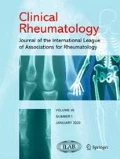Biologic therapy has been a major advance in the treatment of patients with immune diseases. Yet, it is clear that long-term disease management requires a more detailed understanding of factors that influence these drugs’ effectiveness. The authors confirm at least 10 years of observations that immunogenicity most notably with monoclonal antibody therapies results in treatment failure [1]. By contrast, receptor-based constructs seem less likely to be associated with the development of patient-derived antibody failure [2–4]. Also as pointed out by the authors, the development of neutralizing antibodies is independent of underlying immune disease. It is interesting to note that a recently commissioned consensus statement on biologic treatment of rheumatic disease mentioned immunogenicity two times (one time with regard to abatacept and the other time with regard to concomitant methotrexate). A simultaneous search for neutralizing antibodies was fruitless [5].
Long-term observations demonstrate that drop-off rates after institution of biologic treatment is high (likely greater that 50 %). The reasons thought to contribute to this drop-off rate include toxicity, compliance (cost), or loss of effect [6]. As presented in this paper, antibody formation may be as high as 30 % even if the antibody is humanized.
The implications of these findings include at least the following:
-
1.
Moving forward will require a clinically acceptable assay system as an insurance carrier has suggested that present assay systems remain experimental in determining antibody/drug levels in rheumatic disease patients [7].
-
2.
We need long-term data on durability of response using monotherapy with the monoclonal antibodies.
-
3.
The ability of methotrexate, azathioprine, leflunomide, and mycophenolate to inhibit neutralizing antibody formation needs further clarification.
-
4.
Drug developers should take into account the observation that monoclonal antibodies are prone to generate neutralizing antibodies.
References
Baert F, Norman M, Vermaire S, Van Aasche G, D’Haens G, Carbonez A, Rutgeerts P (2003) Influence of immunogenicity on the long-term efficacy of infliximab in Crohn’s disease. N Engl J Med 348:601–608
de Vries MK, van der Horst-Bruinsma IE, Nurmohamed MT, Aarden LA, Stapel SO, Peters MJ (2009) Immunogenicity does not influence treatment with etanercept in patients with ankylosing spondylitis. Ann Rheum Dis 68:531–535
Haggerty HG, Abbott MA, Reilly TP, DeVona DA, Gleason CR, Tay L, Dodge R, Aranda R (2007) Evaluation of immunogenicity of the T cell costimulation modulator abatacept in patients treated for rheumatoid arthritis. J Rheumatol 34:2365–2373
Kaine J et al (2012) Evaluation of abatacept administered subcutaneously in adults with active rheumatoid arthritis: impact of withdrawal and reintroduction on immunogenicity, efficacy and safety (Phase IIIb ALLOW study). Ann Rheum Dis 71:38–44. doi:10.1136/annrheumdis-2011-20034
Furst DE, Keystone EC, So AK et al (2013) Updated consensus statement on biologic agents for the treatment of rheumatic diseases, 2012. Ann Rheum Dis 72:ii2–ii34. doi:10.1136/annrheumdis-2013-203348
Bressler B, Haraqui B, Keystone E, Sette A (2010) Optimizing use of tumor necrosis factor inhibitors in the management of immune-mediated inflammatory diseases. J Rheumatol 37(Suppl 85):40–52. doi:10.3899/jrheum.091464
Draft correspondence between Regence Blue Cross/Blue Shield and the Insurance Subcommittee of the American College of Rheumatology (2013)
Disclosures
None.
Author information
Authors and Affiliations
Corresponding author
Additional information
This article is a commentary to “Drug levels, anti-drug antibodies and clinical efficacy of the anti-TNFα biologics in rheumatic diseases” which can be found at http://dx.doi.org/10.1007/s10067-013-2336-x.
Rights and permissions
About this article
Cite this article
Pixley, J. Immunogenicity, the elephant in the room. Comment on “Drug levels, anti-drug antibodies and clinical efficacy of the anti-TNFα biologics in rheumatic diseases”. Clin Rheumatol 32, 1413 (2013). https://doi.org/10.1007/s10067-013-2364-6
Received:
Accepted:
Published:
Issue Date:
DOI: https://doi.org/10.1007/s10067-013-2364-6

